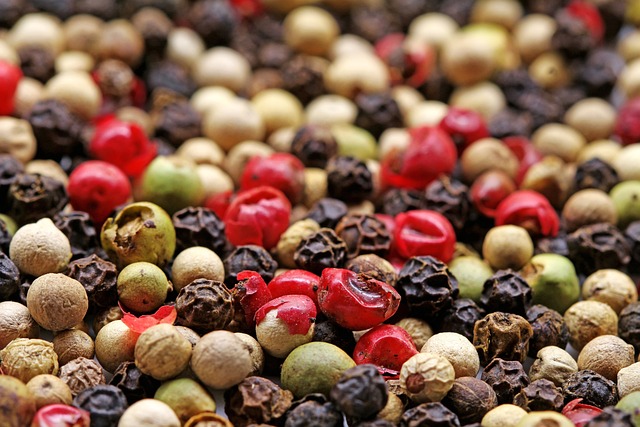Contents
The History and Origins of Black Pepper Powder: From Ancient Times to Present
Black pepper powder is one of the most widely used spices around the world, adding a distinctive flavor and
aroma to various dishes. Its history can be traced back to ancient times, where it played a significant role in
shaping culinary traditions and trade routes.
The origins of black pepper powder can be found in the western ghats of India, where it is believed to have
been cultivated for over 4,000 years. Records indicate that black pepper was highly valued and even used as a
form of currency in ancient civilizations.
The spice gained popularity throughout the Mediterranean region and Europe during the Middle Ages. It was
sought after not only for its unique taste but also for its medicinal properties. Black pepper was believed to
aid digestion, stimulate appetite, and even treat various ailments.
Its demand grew so significantly that exploration expeditions were launched to discover new routes to the
spice-rich lands. These voyages eventually led to the Age of Discovery and the establishment of trade networks,
such as the famous Spice Route, connecting Europe, Asia, and Africa.
Black pepper powder became a symbol of wealth and power during this period, often reserved for nobility and
regarded as a luxury item. Its rarity and high costs further fueled its desirability, making it a valuable
commodity in the global market.
Today, black pepper remains an integral part of various cuisines worldwide. It is no longer exclusive to the
elite but can be found in almost every kitchen. Its availability has increased, thanks to advancements in
transportation and trade, leading to its widespread use by all classes of society.
The Origins of Black Pepper Powder
Black pepper, scientifically known as Piper nigrum, is a widely used spice known for its distinct flavor and aroma. Its history dates back to ancient times, and it has played a crucial role in the culinary and medicinal practices of various civilizations.
Origins in Ancient India
The origins of black pepper can be traced back to ancient India, where it was highly regarded for its medicinal properties. The spice was referred to as “maricha” in Sanskrit, and was often used in Ayurvedic medicine to treat digestive and respiratory ailments.
During ancient times, black pepper was also considered a luxury item and was often used as a form of currency. Its trade routes extended from India to Europe, leading to its popularity spreading across various regions.
Introduction to Europe
Spices, including black pepper, played a significant role in European exploration during the medieval period. The desire for these valuable spices, often used to preserve and enhance the taste of food, motivated explorers to embark on long and perilous journeys.
Black pepper, along with other spices, was transported along the famous Silk Road and eventually reached Europe through various trade routes. Its scarcity and exotic nature made it highly sought after among the elite, further driving its demand.
Colonialism and the Spice Trade
The spice trade, including black pepper, played a significant role in the era of European colonialism. European powers, such as the Portuguese, Dutch, and British, established colonies and trading posts in spice-rich regions, primarily in Asia.
These colonial powers gained control over the production and distribution of spices, including black pepper, which led to increased accessibility and popularity of the spice in Europe. Moreover, black pepper was seen as a symbol of wealth and social status among the European aristocracy.
Modern Cultivation and Usage
Today, black pepper is cultivated in various parts of the world, including India, Indonesia, Vietnam, and Brazil. It is widely used in culinary applications and is an essential ingredient in many traditional recipes.
The versatility of black pepper is notable, as it is used in both savory and sweet dishes. Additionally, it has found its way into non-food items, such as cosmetics and traditional medicine.
Conclusion
The history and origins of black pepper powder are deeply rooted in ancient civilizations and have significantly influenced the course of human history. From its origins in India to its prominence in the spice trade and its widespread usage today, the journey of black pepper mirrors humanity’s quest for flavors, scents, and cultural exchange.
For more fascinating insights into the world of spices, you may find our related post on “The Role of Spices in Ancient Civilizations” to be an engaging read.
Keywords: black pepper, Piper nigrum, ancient India, maricha, Ayurvedic medicine, spice trade, colonialism, European exploration, Silk Road, modern cultivation, culinary applications.
Frequently Asked Questions
What is the history of black pepper powder?
The use of black pepper powder dates back to ancient times. It was highly valued and commonly used in India and other Asian countries. It played a significant role in trade routes and was even regarded as a form of currency. The history of black pepper powder spans thousands of years.
Where does black pepper come from?
Black pepper is native to South India and has been cultivated there for centuries. It is primarily grown in the Malabar Coast, today known as the state of Kerala. However, its popularity led to the spread of cultivation to other parts of Asia and later to Europe, Africa, and the Americas.
How was black pepper powder used in ancient times?
In ancient times, black pepper powder was not only utilized as a spice but also for medicinal and culinary purposes. It was believed to have numerous health benefits and was used for digestive disorders, as an appetite stimulant, and even as a cure for various ailments. Black pepper powder was also used as a preservative and as a means to mask the taste of deteriorating food.
How did black pepper powder reach Europe?
The demand for black pepper in Europe was significant during the Middle Ages. It was highly valued and considered a luxury spice. The trade routes from Asia and the Middle East facilitated its introduction to Europe, becoming an essential commodity for the elite. The lucrative spice trade ultimately led to the exploration and discovery of new trade routes during the Age of Discovery.
What is the importance of black pepper powder today?
In the modern world, black pepper powder continues to hold a prominent place in culinary traditions worldwide. Its distinct flavor and aroma make it a popular spice in various savory dishes, marinades, and sauces. Furthermore, black pepper powder is also recognized for its potential health benefits, including its antioxidant and anti-inflammatory properties.
How is black pepper powder produced today?
To produce black pepper powder, the peppercorns are harvested when they are still green and unripe. They are then dried and can be used whole, crushed, or ground into powder. The grinding process involves crushing the peppercorns into a fine powder, which is ready for use in cooking and seasoning.
Health Benefits of Black Pepper Powder
Overview
Black pepper powder is a commonly used spice that offers various health benefits alongside its distinct flavor. It is derived from the dried berries of the Piper nigrum plant which belongs to the Piperaceae family. This article explores the potential health benefits offered by black pepper powder.
1. Rich in Antioxidants
Black pepper powder is a potent source of antioxidants. These compounds help protect the body from harmful free radicals and reduce oxidative stress, potentially preventing chronic diseases, such as heart disease and certain types of cancer.
2. Enhanced Digestive Health
Consuming black pepper powder may aid in digestion by stimulating the production of digestive enzymes. It can also help relieve flatulence, bloating, and indigestion. Moreover, black pepper powder has been found to have antibacterial properties that promote a healthy gut.
3. Anti-inflammatory Properties
Several studies indicate that black pepper powder possesses anti-inflammatory properties. It may help reduce inflammation in the body, alleviating symptoms of arthritis and inflammatory diseases. Regular consumption of black pepper powder can contribute to improved joint health.
4. Weight Loss Aid
Black pepper powder may aid in weight loss by promoting the breakdown of fat cells and suppressing the formation of new fat cells. The compound called piperine present in black pepper powder is believed to be responsible for this effect. Including black pepper powder in your diet might help manage weight more effectively.
5. Improved Brain Function
Research suggests that black pepper powder, specifically its active component piperine, may enhance brain function. Piperine has been found to increase the production of serotonin and dopamine, neurotransmitters that play a crucial role in mood regulation and cognition.
If you want to learn more about black pepper powder, you can visit the Wikipedia page on black pepper.
The History and Origins of Black Pepper Powder: From Ancient Times to Present
Ancient Spice Trade: Discovery and Early Use
- Black pepper powder was originally discovered in India around 2000 BCE.
- It quickly became a highly sought-after spice due to its strong flavor and medicinal properties.
- Pepper became an important commodity in the ancient spice trade routes.
Spread to the Roman Empire and Middle Ages
- The Romans valued black pepper and used it extensively for culinary purposes and as a form of currency.
- During the Middle Ages, Arab traders dominated the spice trade and controlled the supply of black pepper.
- It was a status symbol and was often used to enhance the flavor of food.
Exploration and Colonization
- European explorers, such as Christopher Columbus and Vasco da Gama, sought new trade routes to bypass Arab monopolies.
- The Portuguese, Dutch, and British established colonies in pepper-producing regions like India and Indonesia.
- Black pepper powder became more accessible and affordable to Europeans.
Modern Usage and Production
- Black pepper powder is widely used in cuisines around the world for its distinct flavor.
- It is a key ingredient in many spice blends and seasoning mixes.
- Major producers of black pepper today include India, Vietnam, Indonesia, and Brazil.








































